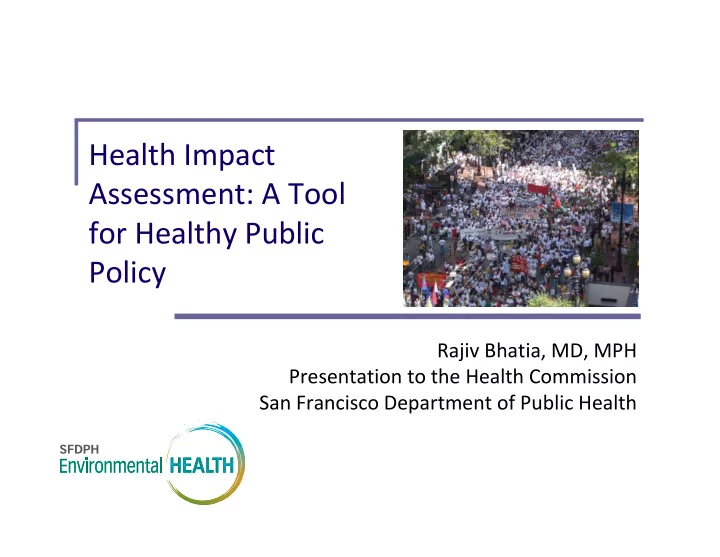

Health Impact Assessment: A Tool for Healthy Public Policy Rajiv Bhatia, MD, MPH Presentation to the Health Commission San Francisco Department of Public Health
Public health is what we, as a society, do collectively to assure the conditions for people to be healthy.” ‐‐ Institute of Medicine (1988) 2
Health Impact Assessment supports informed policy ‐ making …a combination of procedures, methods and tools …that systematically judges the potential, and sometimes unintended, effects of a policy, plan, program or project on the health of a population ….and the distribution of those effects within the population …[and] identifies appropriate actions to manage those effects. ‐‐ International Association of Impact Assessment Adaptation of WHO definition
Good Policy & Law Requires An Understanding Of Health Impacts Planning, building, housing, transportation, consumer product, and environmental regulations are all justified by the protection of health and welfare The National Environmental Health Policy Act (NEPA) requires analysis of health and safety problems caused by physical changes Environmental justice mandates to identify and address adverse health effects on low income and minority populations Cost ‐ Benefit analysis of public policy places economic value on health effects
Health Benefits Analysis of the 1999 San Francisco Living Wage Law Quantified the Health and Social Benefits of a Living Wage Life ‐ expectancy, education, depression, sick leave Contributed to local support for living wage law Demonstrated public health could contribute to social and economic policy Led to awareness of HIA Led to new partners for work on social determinants 5
HIAs Completed or In ‐ Progress in San Francisco (1999 – 2011) Labor (4) Land Use (6) Housing (6) Transport (2) Energy (1) Environment (1) Local (17) State (2) National (1)
HIA of SF Road Pricing Feasibility Study (2011) • Substantial, quantifiable health burdens from transportation system, including air pollution ‐ related mortality, noise ‐ related heart disease, and traffic injuries to pedestrians and cyclists • Opportunities to increase walking and bicycling Northeast Cordon • Disproportionately burdens within the (AM/PM, $3) pricing zone • Anticipated increases in adverse transportation impacts in priority development areas • Modest benefits from pricing effects on traffic volume under future conditions. Health Impacts?
Healthy Development Measurement Tool (2007) 1) Community vision for a health city (27 objectives) 2) Community ‐ level Health Indicators 3) Policy and Design Strategies 4) Criteria for healthy development 5) Public Health Evidence 8
Spatial Models of Particulate Matter Concentration Identifies high pollution areas for emissions and exposure reductions 9
Statutory Protections for Housing in Traffic Pollution Hot Spots (2008) Identified Areas with Potential Conflicts through Roadway Exposure Zone Map Established an Action Level for Mitigating indoor air quality Established performance criteria for enhanced ventilation systems.
Participation in Local & Regional Planning Efforts San Francisco • SFMTA, SFCTA, SFDCP , MOH, DPW, MTC, • Walk SF , CA Walks, PODER, Urban Habitat. • Mayor’s Pedestrian Safety Task Force • Inter-Agency Sustainable Communities Workgroup • HOPE SF Health Task Force • Developers Regional • HIA Collaborative • MTC Equity Advisory Committee
Current Approach to HIA Sustainable Community Candidate Topics for HIA Policy Dialogues • Air Quality Hotspots • Ventilation Standards for • Pedestrian Injuries Air Pollution Hotspots • Transportation Efficiency • Energy Efficiency Subsidies • Housing Affordability, for Housing Adequacy & Quality • SF Traffic Calming Tools • Economic Development • Food Systems
Policy Policy/Project/ Plan/ Decision Target(s) Potential health and Value of Feasibility Screening Context Program equity impacts/ benefits information Outcome Community Risk High, expands area Could justify Available lit; Committed Amendments to health code ventilation standards Reduction Plan (CRRP) subject to AQ amendments to modeling Legislation protections, law; inter ‐ tools; for residential buildings in high air pollution zones requirements applicable agency support staffing Air Pollution Risk in areas of highest air and Disparities pollutants CRRP High, multiple health Could justify Available lit; Committed Targeted building State/fed public benefits, targeting to modification of UCB performance and ventilation subsidies programs to subsidize vulnerable populations program; inter ‐ student building energy agency support support efficiency Community Risk Pending Limitations of Truck Routes in resid. districts Reduction Plan City pilot program of Pending Automatic Speed Enforcement on high injury automated speed Pedestrian and Bicycle Safety enforcement arterial roadway City traffic calming Pending Lane narrowing vs. road toolkit diets vs. enforcement for arterial traffic calming City traffic calming Restrict turns to injuries Pending toolkit of right of way violations Regional Transport. Van Ness Bus Rapid No HIA; Provide Transportation Plan focused TA via EIA Transit (BRT) Efficiency 1 Bay Area Grant Prgm comment letter SFMTA No HIA; Focused design Transit Effectiveness recs for TEP implementn Project (TEP)
National Leadership and Recognition First U.S. City to develop a sustained HIA practice Internationally recognized as leader in the field Mentorship and training of new practitioners Contributed to standards and guidance for practice Current HIA funding under CDC collaborative agreement 14
Outcomes: Organizational learning & New Partnerships ! Direct Outcomes Changes to policy design Indirect Outcomes Public understanding of health determinants Agency capacity to measure environmental and social determinants and disparities Agency understanding of other policy sectors Constructive public and private sector partnerships Integration of public health objectives in other public sector organizations New public health policy and regulation 15
Resources: The SF Bay HIA Collaborative SF HIA Collaborative www.hiacollaborative.org SF Department of Public Health www.sfphes.org UC Berkeley HIA Group http://sites.google.com/site/ucbhia Human Impact Partners www.humanimpact.org
Recommend
More recommend